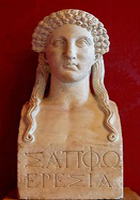Hymn To Aphrodite Poem by Sappho
Hymn To Aphrodite
Throned in splendor, immortal Aphrodite!
Child of Zeus, Enchantress, I implore thee
Slay me not in this distress and anguish,
Lady of beauty.
Hither come as once before thou camest,
When from afar thou heard'st my voice lamenting,
Heard'st and camest, leaving thy glorious father's Palace golden,
Yoking thy chariot. Fair the doves that bore thee;
Swift to the darksome earth their course directing,
Waving their thick wings from the highest heaven
Down through the ether.
Quickly they came. Then thou, O blessed goddess,
All in smiling wreathed thy face immortal,
Bade me tell thee the cause of all my suffering,
Why now I called thee;
What for my maddened heart I most was longing.
"Whom," thou criest, "dost wish that sweet Persuasion
Now win over and lead to thy love, my Sappho?
Who is it wrongs thee?
"For, though now he flies, he soon shall follow,
Soon shall be giving gifts who now rejects them.
Even though now he love not, soon shall he love thee
Even though thou wouldst not."
Come then now, dear goddess, and release me
From my anguish. All my heart's desiring
Grant thou now. Now too again as aforetime,
Be thou my ally.
Startling howcwell Sappho wrote in fairly modern English! What a genius!
The pronoun 'she' should be used in place of 'he, ' for that was what Sappho originally wrote in her works.
This poem has not been translated into any other language yet.
I would like to translate this poem
PoemHunter should add the name of the translator to these ancient poems translated from Greek and all similar poems from other languages.